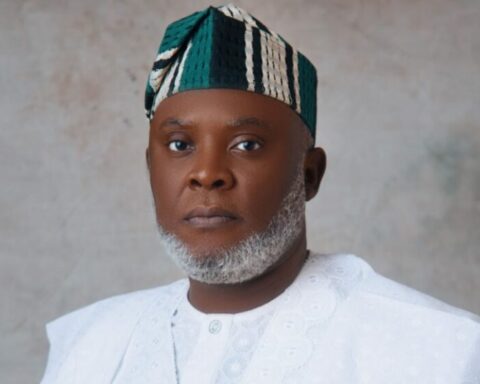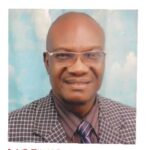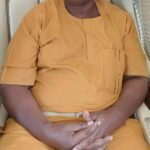By Lasisi Olagunju
Respect old age. A “strictly by invitation” conclave of Yoruba cardinals sat for two days last week, not in the traditional capital, Ibadan, but in aged Akure, Ondo State. They took the masquerade to the eastern ancestral grove and had it costumed there. If your masquerade was not there, it is because your buttocks were deemed too small for the gilded stools there. And by not being there, you just missed balls of àkàrà made specially in frying pans of honey. The cardinals sat and chose for the whole race and decreed that “we must speak with one voice.” Their Holinesses danced to African pop singer, Angélique Kidjo’s ‘Agolo’ in their own sacred way and ordered that the waist-beads of their Olajumoke must remain where it is. Who are we to say the mouth of the elder stinks? That is the judgment of age, the decree from the ancestors’ gavel. Coourt!
It is an African thing. Of what use is age if you can’t use it to dominate the youth? Àgbà kò níí tán l’órí ilè is a daily prayer in Yoruba land. It simply means “may elders not be extinct in our land.” What the Akure papacy wants is already being done in other parts of Africa. The results have been phenomenal. I am moving from Cameroon to Côte d’Ivoire, then Tanzania, and, then other places where age is prized far higher than rubies.
They say wisdom comes with age. If that is true, no matter how “disgraced” Donald Trump says we are, East and West, Nigeria has pearls of ancestral wisdom. To our immediate East, we have Paul Biya of Cameroon; a little far west, there is Alassane Ouattara of Côte d’Ivoire. They are the current champions. Our immediate western neighbour, Benin Republic, has just banned the main opposition candidate and his party from the next presidential poll. These and many more enjoy the nod of the lords who created these countries.
I have ‘data’ people, young persons around me. They flirt into my fort and speak grammar and literature. First, they talk “gerontocracy”; then I hear “heart-cutting paradox” of Africa being the world’s youngest continent by median age, “yet it is being governed by some of the oldest leaders on earth.” Talk is cheap. What do they know? What an elder sees while seated, a child in space can’t see.
Indeed, Africa, this moment, has the wisest gathering of aged priests of power ever assembled.
In the North, there sits Abdelmadjid Tebboune of Algeria (80), Abdel Fattah el-Sisi of Egypt (71), and Kais Saied of Tunisia (67 — just under seventy, but invested with self-made powers broad enough to last him till eternity).
In West Africa, the procession of patriarchs includes Bola Ahmed Tinubu of Nigeria (73), Joseph Boakai of Liberia (80), and Alassane Ouattara of Côte d’Ivoire (83). Nana Addo Dankwa Akufo-Addo of Ghana, now 81, bowed out, leaving the stage in January 2025 for his old rival, John Dramani Mahama, 66, to steer the ship once again.
In Central Africa, Mother Africa is still blessed with the grandest of elders: Paul Biya of Cameroon (92), Teodoro Obiang Nguema Mbasogo of Equatorial Guinea (83), and Denis Sassou-Nguesso of the Republic of the Congo (81).
In Eastern and Southern Africa, the grey reign continues: Yoweri Museveni of Uganda (81), Isaias Afwerki of Eritrea (79), Emmerson Mnangagwa of Zimbabwe (83), and Cyril Ramaphosa of South Africa (73). Hage Geingob of Namibia passed away on 4 February 2024 at the age of 82. He was succeeded by 84-year-old Nangolo Mbumba, who served until the March 2025 election that brought Netumbo Nandi-Ndaitwah, 73, to power — the country’s first female president.
Farther east, Djibouti’s parliament has just erased the age barrier that once capped presidential ambition, clearing the path for 77-year-old Ismaïl Omar Guelleh to seek a sixth term in 2026. And on the Ethiopian plateau, President Taye Atske Selassie will turn 70 next year.
We respect and value age; that is why Africa remains forever at the top. We are the continent where wisdom and endurance sit enthroned in power.
President Alassane Ouattara of Côte d’Ivoire is 83. He has just clinched a fourth term with the ease of a man ordering breakfast. Cast your gaze eastward to Cameroon, 92-year-old Paul Biya is there. BBC last week described him as “the leader who never loses.” He has kindly agreed to remain in office after only 43 years of national service – or should I simply call his reign ‘uninterrupted power supply’? Forty-three years in some democracies would be called eternity; here in Africa, from the Mediterranean to the Cape of Good Hope, it is continuity.
Nigeria has so much to learn especially from Cameroon where grey hair rules completely and totally. Cameroon has a council of elders whose word is law. I searched the World Wide Web, asking the oracle for the secret of that country’s success. It is the bent gait of the leaders and the age of their ideas. It is difficult to believe, but it is true, the elders list is real: To President Biya’s right is the President of the Constitutional Council, Clément Atangana; he is 84 years old. Atangana it was who oversaw the recent election and announced the results that are being celebrated with stones and bullets in the streets of the country. There is also René Claude Meka, the 86-year-old Chief of Defence Staff. He guards the guards in the name of democracy. The president of the senate is Marcel Niat Njifenji, 91 years old. With Cavayé Yéguié Djibril, the 85-year-old Speaker of the National Assembly, Njifenji sees that laws are made for the good governance of the republic. They make laws, and when they finish minting the laws, they pass them to 83-year-old Laurent Esso, the indefatigable Minister of Justice. He executes the law and its convicts. The job of this council of elders is to keep the grandfather in power and tell the young to wait for their time.
We have done well with democracy in Africa. It is no longer about freedom and welfare, and good living and life more abundant. It is about endurance – like dull, painful sex.
Latecomer Nigeria does not (yet) have its own official elders council as Cameroon. It should quietly be taking notes; that is what the wise do. We should envy Cameroon; Cameroon deserves our envy.
In Bénin, the constitutional court on 27 October, 2025, ruled to exclude the principal opposition party, Les Démocrates, from participating in the upcoming 2026 presidential election. The coast is clear for democracy in that country and for the incumbent. In East Africa, Tanzania’s presidential election was held on Wednesday last week. But the gods of polls had cracked the palm kernel of victory for the incumbent before the election day. President Samia Suluhu Hassan stood (and stands) on terra firma. She won before winning. Her opponents, candidates of the two primary opposition parties, were removed from the ballot by the gods of democracy. Their supporters are outside, burning tyres and getting buried.
Nigeria will do better than Benin and Tanzania. If those ones had appreciated better intelligence, they would not run into the quicksand of protests harrying their hills. Instead of shutting the gate against opponents and running against themselves, how about those opposition candidates simply defecting into the ruling party? If you check the physics of politics, you will understand why politicians are ferromagnetic beings; they respond to the magnet of money and power. In Nigeria, nobody will be disqualified in the next elections. The magnet in the ruling party sucks them into the vortex of power, and that ends it. Never mind what an Abuja court said on defection last Friday. The defected should forfeit their seats. Who does that? The higher courts will correct the abnormal orders.
Yoruba ancestors are great scientists. There is this Yoruba spell that pulls whoever it wants into its bossom:
Gerere,
Àwọ̀n maa wo won bo,
Gerere…
(Swiftly/ Net, drag them here/ Swiftly).
People of depth who massed in Akure last week know how this magnetic net is woven. It works in Yoruba’s Lagos – it is working in Nigeria. The Tanzanian lady should have come to learn here.
I read online about children of protest dreaming of Tanzania in Nigeria. No. It won’t happen. Where is the main opposition party, the PDP? By the time we reach 2027, no opposition contraption will be well enough to stagger out of the ICU. After that feat, we will move to the next. What is next? Third term?
‘Third term’ is scandalous; we don’t want that chain for the neck of our Olajumoke. The respectable career goal is to be so good as to be begged to become king.
Let the children of anger keep punching their tired tabs and overused phones. Someone told me that when they finally look up from those chinko phones and ask, “Who’s that old man on the ballot again?” the answer will definitely be: “The same man you voted for when you were in primary school.”
Africa is proof that democracy is tired of term limits. The British blessed us with permanent secretaries; why not bless ourselves with permanent councils of elders complete with a permanent presidency. Imagine the elegance in that alliteration: “permanent presidency.” Pulsating.
Even in America where we copied this democracy nonsense, they are already building a throne for their king and sewing very regal royal robes. They have a king.
I read Thomas E. Cronin’s ‘On the Origins and Invention of the Presidency’ and laughed at the folly in the wisdom of the past. Cronin, by “presidency” meant American presidency.” He wrote: “In 1787 fifty-five of America’s best educated and most experienced men assembled in Philadelphia. Their average age was 42, most were lawyers or businessmen. Two-thirds had served in the Congress at one time or another; nearly twenty had served in the Continental army. Seven had been governors in their states. It was a convention of the well-bred, well-fed, well-read and well-wed.” These were the people, the 55 wise men who invented America’s presidential democracy, the one we copied like that poor student who Rank-xeroxed his mate’s exam script, name, matric number, all.
The mandate of the American wise men, according to Cronin, was “to devise an executive office that would also be effective and safe; strong enough to command respect, to help maintain order, to help conduct effective diplomatic affairs, to provide for more efficient administration, yet not so strong as to threaten civil liberties, or in any way aggrandize power contrary to the welfare of the general public.” They did what they had to do and for 229 years, they thought they got it right. They were wrong. Trump, holding Muhammadu Buhari’s toothpick, is at this moment, laughing at their wisdom.
A permanent presidency – a king – is being considered by those around America’s Trump. Or where were you last week when former White House chief strategist, Stephen Bannon, told The Economist that President Donald Trump would serve a third term? Stephen Bannon described a third term for Trump as essential to the nation’s future, a “vehicle of divine providence”, an “instrument of divine will” and “the will of the American people.” We were very unfair to President Olusegun Obasanjo, a successful third term for him would have been a valuable part of contemporary America’s literature review.
This is the age of the aged. We should tell William Shakespeare that he lied; that the poet lied in his claim that “All the world’s a stage,
And all the men and women merely players;
They have their exits and their entrances;
And one man in his time plays many parts,…”
Shakespeare says the drama of life always comes to an end for actors and for spectators. It is not so in Africa. Go to Togo, don’t they have Faure Gnassingbé there after Gnassingbé Eyadéma? Gnassingbé served as the president of Togo from 1967 until his death in 2005. Gnassingbé Eyadéma’s son, Faure, filled what would have been a gap immediately and has led Togo since then. What else is the meaning of immortality?
Nigeria can improve on this. One man can be president; his son governor; his brother minister; his grandchildren commissioners.
The president can even combine all those posts and positions if he wants. It will be answered prayers.
This is a satire, but sometimes words fail the satirist and his satire. Satire itself is a dangerous thing because sometimes it stops being seen for what it is. But on this, I double down and hiss on reason and good judgment. This is the age of wisdom, I cling to the tail of the elephant of the aged, he alone can take us up the mountain before us.
In ‘As You Like It’, Shakespeare’s Jaques delivers the locus classicus on the seven ages of man. Life, Shakespeare’s character says, unfolds in seven acts; he calls them “ages”. First comes the helpless infant, “mewling and puking” and crying in a nurse’s arms; then the reluctant schoolboy, weeping and creeping to class with a shining face. Next, the lover, scribbling and sighing over verses, love poems, to his beloved; followed by the fiery soldier, proud, quick to quarrel, chasing fleeting glory: “A soldier, / Full of strange oaths, and bearded like the pard, / Jealous in honour, sudden and quick in quarrel, / Seeking the bubble reputation /Even in the cannon’s mouth.” Then appears the wise judge, full of proverbs and dignity, his form rounded by comfort. Then age steals in, turning him into a thin, slippered old man, his once-bold voice now trembling and shrill. At last, the curtain falls on all, a return to infancy, “second childishness” and forgetfulness, bereft of sight, sound, taste, and self:
“Last scene of all,
That ends this strange eventful history,
Is second childishness and mere oblivion;
Sans teeth, sans eyes, sans taste, sans everything.”
For all enemies of age, I render, in modern English, the last stage in the passage above, Act II, Scene VII:
“The final stage of life
that ends this strange and eventful journey
is a return to childishness and complete forgetfulness;
without teeth, without eyes, without taste, without anything at all.”
The Shakespearean last stage is the age of nothing and nothingness. That is the age of our leaders. In nothing, nothing is bad. We love our own old age, we want it as long as it is Idi Bebere, the voluptuous, supple waist of Olajumoke.



























